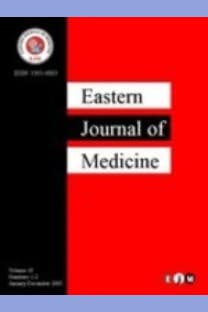Assessment of vitamin D levels in patients with acute coronary syndrome
___
1. Solinas L, Raucci R, Terrazzino S, et al. Prevalence, clinical characteristics, resource utilization and outcome of patients with acute chest pain in the emergency department. A multicenter, prospective, observational study in north-eastern Italy. Italy Heart J 2003; 4: 318-324.2. T.C. Ministry of Health, General Directorate of Primary Health Care Services, Ankara, Turkey Cardiovascular Disease Prevention and Control Program; Strategic Plan and Action Plan for Risk Factors, publication no: 812, date: 2010.
3. Weiss R, Dziura J, Burgert TS, et al. Obesity and the metabolic syndrome in children and adolescents. N Engl J Med 2004; 350: 2362- 2374.
4. Ninomiya JK, L'Italien G, Criqui MH, et al. Association of the metabolic syndrome with history of myocardial infarction and stroke in the Third National Health and Nutrition Examination Survey. Circulation 2004; 109: 42- 46.
5. Holick MF. Vitamin D: importance in the prevention of cancers, type 1 diabetes, heart disease, and osteoporosis. Am J Clin Nutr 2004; 79: 362- 371.
6. Holick MF. Sunlight and vitamin D for bone health and prevention of autoimmune diseases, cancers, and cardiovascular disease. Am J Clin Nutr 2004; 80: 1678-1688.
7. Gordon DJ, Probstfield JL, Garrison RJ, et al. High-density lipoprotein cholesterol and cardiovascular disease. Four prospective American studies. Circulation 1989; 79: 8-15.
8. Criqui MH, Wallace RB, Heiss G, et al. Cigarette smoking and plasma high-density lipoprotein cholesterol. The Lipid Research Clinics Program Prevalence Study. Circulation 1980; 62: IV70-IV76.
9. Wood PD, Stefanick ML, Williams PT, Haskell WL. The effects on plasma lipoproteins of a prudent weight-reducing diet, with or without exercise, in overweight men and women. N Engl J Med 1991; 325: 461-466.
10. Campeau L. Letter: Grading of angina pectoris. Circulation 1976; 54: 522-523.
11. Assmann G, Schulte H. Relation of high-density lipoprotein cholesterol and triglycerides to incidence of atherosclerotic coronary artery disease (the PROCAM experience). Prospective Cardiovascular Münster study. Am J Cardiol 1992; 70: 733-737.
12. Demirci C, Ozbakkaloğlu M, Yildirim A, Cakmak T, Yavuzgil C. Plasma Homocysteine Levels in Patients with Acute Coronary Syndrome. SSK Tepecik hospital journal 2003; 13: 91-96.
13. Akbulut M, Ozkan Y. Unstable Relationship between C-Reactive Protein (CRP) Levels and Coronary Arterial Involvement in Patients with Angina Pectoris. Fırat University Journal of Health Sciences 2000; 14: 291-294.
14. Fox KA. Coronary disease. Acute coronary syndromes: presentation--clinical spectrum and management. Heart 2000; 84: 93-100.
15. Braunwald E. Unstable angina. A classification. Circulation 1989; 80: 410-414.
16. Genest JJ Jr, Martin-Munley SS, McNamara JR, et al. Familial lipoprotein disorders in patients with premature coronary artery disease. Circulation 1992; 85: 2025-2033.
17. Hasdai D, Porter A, Rosengren A, et al. Effect of gender on outcomes of acute coronary syndromes. Am J Cardiol 2003; 91: 1466-1469.
18. McSweeney JC, Cody M, O'Sullivan P, et al. Women's early warning symptoms of acute myocardial infarction. irculation 2003; 108: 2619- 2623.
- ISSN: 1301-0883
- Yayın Aralığı: 4
- Başlangıç: 1996
- Yayıncı: ERBİL KARAMAN
Which hemogram parameter is more cautionary in euthyroid patients with gestational diabetes mellitus
Large sphenoorbital meningioma with extension into the cavernous sinus
Nitin K. SETHİ, Tomoko IKUİNE, Nicolle STEİNER
Assessment of vitamin D levels in patients with acute coronary syndrome
Cardiac hypertrophy and heart failure: From the case to review of literature
Francesco MASSONİ1, Lidia RİCCİ, Claudio SİMEONE, Serafino RİCCİ
Okan FACULTY OF MEDİCİNE YUZUNCU YİL UNİVERSİTY
The efficiency of hemodialysis in transfusion-related acute lung injury (TRALI): A case report
Uğur GÖKTAŞ, NUREDDİN YÜZKAT, Lokman SOYORAL, M. Bilal ÇEĞİN, Abdullah KAHRAMAN
Combined sciatic-psoas compartment nerve block in a patient with multiple myeloma
Examination of atypical located hydatid cyst disease in Eastern Turkey
Ethylmalonic encephalopathy associated with respiratory failure
